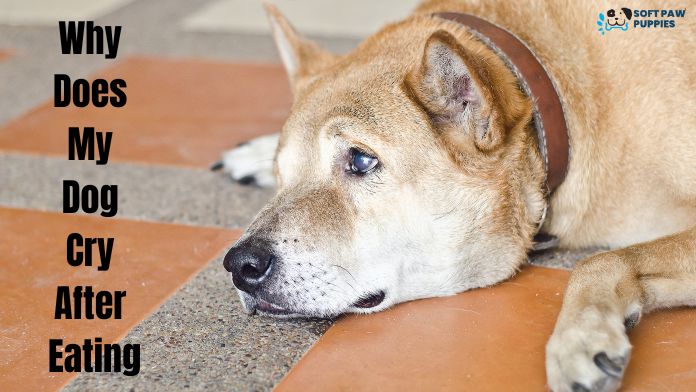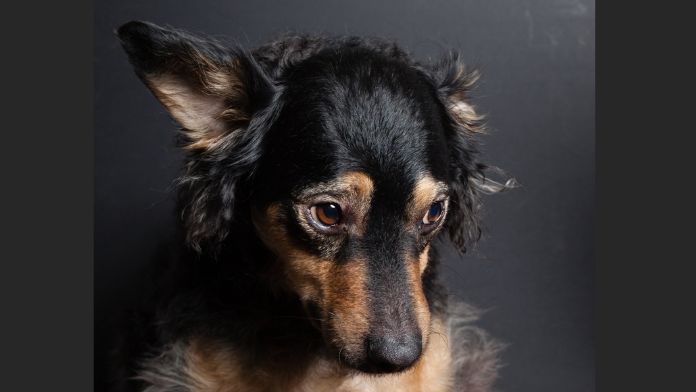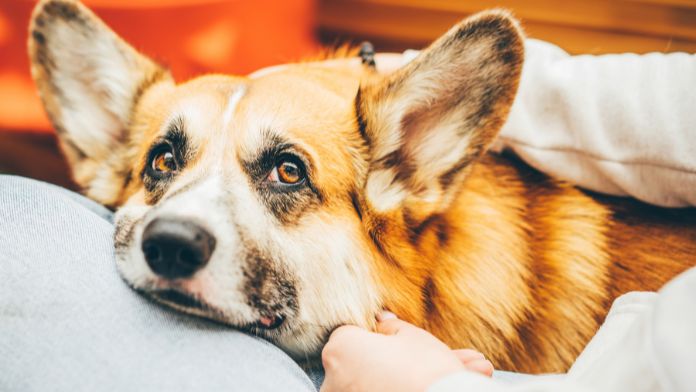
As a dog owner, you’ve probably noticed some interesting behaviors in your furry friend, and one that might leave you scratching your head is when your dog cries after eating. It’s not uncommon for dogs to exhibit various behaviors after a meal, and while some are completely normal, others may indicate an underlying issue that needs attention. This article will explore why your dog might cry after eating and what you can do about it.
Why Does My Dog Cry After Eating?
First and foremost, it’s critical to realize that a dog crying after eating does not indicate well. One of the possible explanations for this is that they are in agony. Occasionally, kids experience pain and tears due to dental breakage, dyspepsia, infections, and certain allergens in their mouths. Moreover, if the dog is sobbing after overindulging, it means their stomach is empty, and they feel full.
A Dog Crying After Eating Is Not a Good Sign
A puppy crying after eating is not a good sign. While occasional whining or crying may be due to excitement or attention-seeking behavior, persistent or painful cries should not be ignored. These could indicate underlying issues such as dental problems, gastrointestinal discomfort, allergies, or serious health conditions. Pet owners need to pay close attention to their furry companions’ post-meal behavior and consult a veterinarian if the crying persists or is accompanied by other concerning symptoms. Prompt attention to your dog’s well-being ensures they lead a healthy and happy life.
Behavioral Reasons
A common reason for your dog’s post-meal tears could be behavioral. Dogs are incredibly expressive creatures, using different forms of communication to express themselves.

-
- Excitement: Sometimes, dogs get excited when it’s mealtime. They may whine or cry in anticipation of a tasty meal. This is usually a harmless expression of eagerness and should subside once they start eating.
- Attention-seeking: Dogs are smart and quickly learn that crying after eating gets them attention. If you’ve ever given your dog extra treats or playtime when they’ve cried after a meal, they might be doing it to get more of your time and affection.
- Anxiety or stress: Dogs can experience anxiety or stress like humans. If your dog is anxious or stressed, they might cry after eating to cope with their emotions. This is especially common in rescue dogs or those who have experienced trauma.
Physical Reasons
Sometimes, crying after eating can be related to physical discomfort or health issues.

-
- Dental problems: Dental issues, such as a loose tooth or gum irritation, can make eating painful for your dog. If they cry after eating, it might be their way of telling you something is wrong with their mouth. It’s essential to have their teeth checked regularly by a veterinarian.
- Stomach problems: Gastrointestinal issues like indigestion, gastritis, or constipation can cause discomfort after eating. Dogs might cry or whine to express their discomfort. If this behavior continues or is accompanied by other concerning symptoms like vomiting or diarrhea, consult your vet.
- Allergies or food sensitivities: Dogs, like humans, can have allergies or food sensitivities. If your dog is crying after a meal, it could be because something in their food is causing an adverse reaction. Switching to a hypoallergenic diet or consulting with a veterinarian for allergy testing might be necessary.
Breed-Specific Factors
Some dog breeds are more prone to certain behaviors, including crying after eating.
-
- Brachycephalic breeds: Breeds like Bulldogs, Pugs, and Shih Tzus have flat faces, making eating challenging. They may cry or snort after eating because of the effort it takes to consume their food. Consider using special bowls designed for flat-faced breeds to make mealtime more comfortable.
Temperature Sensitivity
Dogs are sensitive to temperature changes, and extreme cold or hot weather can affect their eating habits.
-
- Cold weather: In colder climates, dogs may cry after eating because the cold can make their teeth and gums more sensitive. Ensuring that their meals are at a comfortable temperature or feeding them indoors can help alleviate this issue.
- Hot weather: On the other hand, hot weather can lead to dehydration, which can cause discomfort after eating. Ensure your dog has access to fresh water, and try feeding them during cooler parts of the day if you live in a hot climate.
Overeating or Eating Too Quickly
Dogs, especially those who are food-motivated, can sometimes overeat or eat too quickly. This can lead to discomfort and, in some cases, crying.
-
- Overeating: If your dog eats more than they should in one sitting, their stomach may become distended, leading to discomfort and crying. To prevent this, ensure you feed them the appropriate portion sizes based on their size and activity level.
- Eating too quickly: Some dogs are notorious for gobbling down food without chewing properly. This can result in swallowing air, which can lead to stomach discomfort. Consider using slow-feed bowls or puzzle feeders to encourage your dog to eat slower.
Age-Related Issues
Your dog’s age can also affect their behavior after eating.
-
- Puppies: Young puppies may cry after eating due to their high energy levels and excitement. This behavior will likely decrease as they grow and their digestive system matures.
- Senior dogs: Older dogs may experience age-related health issues that cause discomfort after eating. Arthritis or joint pain can make it challenging to assume the eating position, leading to crying. Providing an elevated feeder can make mealtime more comfortable for senior dogs.
Additional Ideas and Points to Think About
Your first port of call will be your veterinarian should any pain appear during digestion. Though nothing life-threatening, things in the digestive tract should be treated carefully, even if they ache and are uncomfortable. Twisting of the intestines or stomach is extremely common and can be fatal. All of the nutrition and energy your dog uses throughout the day comes mostly from its digestive tract, so it’s critical to ensure nothing is getting in the way of that. Your dog has started down a short-term, slippery slope if they become uncomfortable or in pain when eating.
Conclusion
While it’s not unusual for dogs to cry after eating, paying attention to the context and frequency of this behavior is essential. It may be harmless and related to excitement or attention-seeking in many cases. However, if your dog consistently cries after eating, especially if other concerning symptoms accompany it, it’s crucial to consult a veterinarian. They can help rule out any underlying health issues and make mealtime a more comfortable and enjoyable experience for your furry friend. Understanding your dog’s unique needs and behaviors is crucial to being a responsible and caring pet owner.
FAQ
When My Dog Eats, Why Does He Cry?
You have fixed the problem if they eat and stop weeping. It’s possible they were experiencing a growth spurt and needed more food than normal. Try not to force-feed them if they refuse to eat; they are not hungry; instead, they are upset about something else.
Why Is My New Puppy Crying When It Goes to Bed?
Weeping puppies may indicate health, environmental, or feeding issues. Watching your puppy weep to sleep hurts if you’re a dog owner! When someone cries so much, it’s critical to understand the potential causes and strategies for relieving them.
Why Is My Dog Whining While I’m Eating?
Your dog may be whining during mealtimes for the following reasons and factors that may increase their likelihood. It could be your dog’s hunger that is the source. This would be more likely if they start to complain more before being fed, for example, if you serve them breakfast before giving them a meal. In this instance, feeding them earlier might be beneficial.






